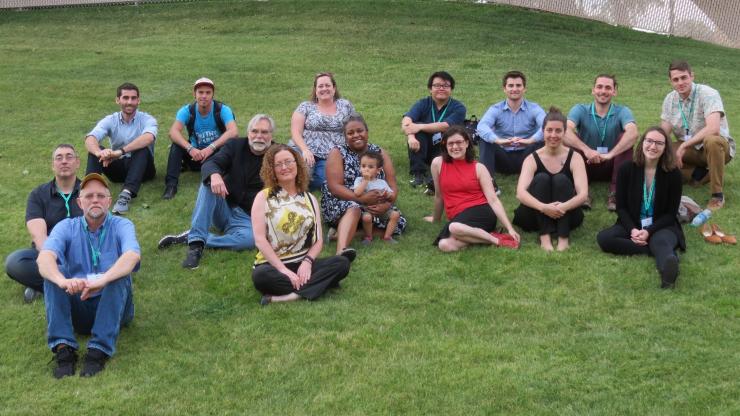-
Astrobiology Rising at Georgia Tech
November 16, 2017 / Written by: Georgia Tech
Some of the researchers of Georgia Tech at AbSciCon 2017. From left: Cesar Menor-Salvan, Nick Hud, Justin Lawrence, Jacob Buffo, Frank Rosenzweig, Amanda Stockton, Britney Schmidt, Kennda Lynch, Gavin Mendez, George Tan, Jennifer Glass, Zachary Duca, Nadia Szeinbaum, Aaron McKee, Chloe Stanton, and Marcus Bray (Courtesy of Jennifer Glass). Source: Georgia TechIn the Ford Environmental Science and Technology Building, the office of Martha Grover is three doors from that of Jennifer Glass. Both are Georgia Tech scientists doing research related to astrobiology – life in the cosmos – but until last year they hardly talked to each other as researchers with common interests.
“We are all so busy,” says Grover, a professor in the School of Chemical and Biomolecular Engineering, a scientific collaborator at the NSF/NASA Center for Chemical Evolution (CCE), and a member of the Center for Space Technology and Research (C-STAR).
Now, Grover, Glass, and others at Tech are members of a growing community that’s coalescing astrobiology activities across campus. In a public debut of sorts, six members of Georgia Tech Astrobiology, as the community calls itself, participated in the 2017 Dragon Con, the premier pop-culture convention on science fiction and fantasy. They wowed the audience, not by fiction or fantasy or over-the-top costumes, but by progress in answering fundamental questions – How did life begin? Where else could life exist? – happening right next door from the meeting venue, at Georgia Tech.
The growing visibility of researchers interested in astrobiology is helping Georgia Tech emerge as a powerhouse in the field. At minimum, says Kenneth Knoespel, a historian of science and professor in the Ivan Allen College of Liberal Arts, “it affirms the importance of this community at Georgia Tech and the importance of astrobiology as a new configuration of disciplines that brings together the natural and human sciences.”
“Georgia Tech is clearly recognized as a hub for astrobiology and maybe the one that’s growing the most quickly,” says Edward Goolish, the deputy director of the NASA Astrobiology Institute (NAI), one of the six elements of the NASA Astrobiology Program. People at Georgia Tech, Goolish adds, “have been generous with their time and have contributed in important ways when NASA has reached out to the science community for input.”
Read the full story at the Georgia Tech website.
Source: [Georgia Tech]
- The NASA Astrobiology Institute Concludes Its 20-year Tenure
- Global Geomorphologic Map of Titan
- Molecular Cousins Discovered on Titan
- Interdisciplinary Consortia for Astrobiology Research (ICAR)
- The NASA Astrobiology Science Forum Talks Now on YouTube
- The NASA Astrobiology Science Forum: The Origin, Evolution, Distribution and Future of Astrobiology
- Alternative Earths
- Drilling for Rock-Powered Life
- Imagining a Living Universe
- Workshops Without Walls: Astrovirology